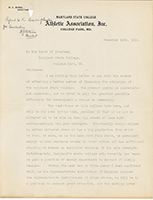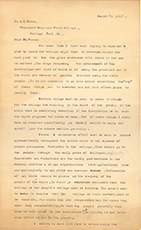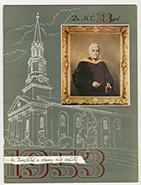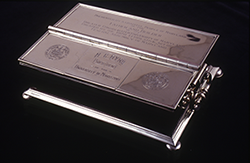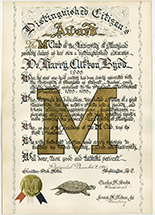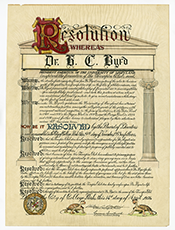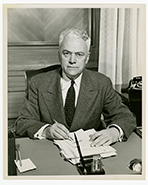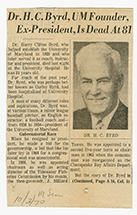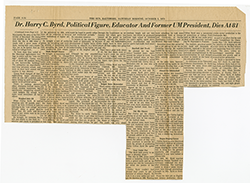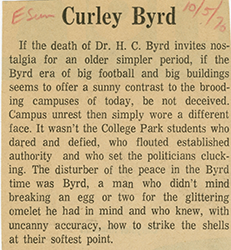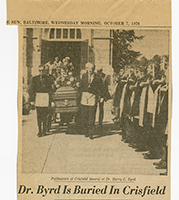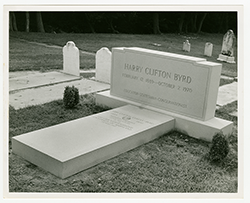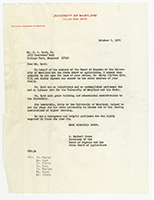Visionary
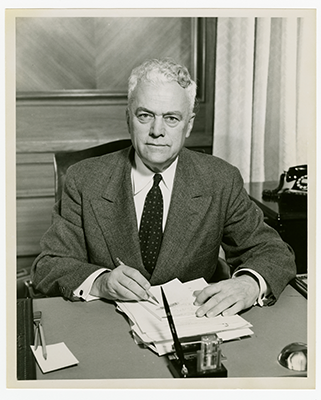
Harry Clifton Byrd died on October 2, 1970, of a heart condition, in University Hospital in Baltimore, Maryland. He left behind an incredible legacy of devotion to the welfare of his alma mater, the University of Maryland, and the citizens of the state of Maryland.
That devotion manifested itself in many ways. From his earliest days as a faculty member and administrator at the university, he was full of plans and ideas to improve the institution, and throughout his career, no detail was too small to receive his attention, from parking spaces to window screens to the introduction of new academic courses and the construction of major buildings. He persistently lobbied the members of the General Assembly, the governor, the Board of Regents, and the citizens of Maryland to obtain support for his beloved university. He would often roust university staff members out of bed late at night to walk the campus with him and discuss plans for improvements, and when he left the university in 1954, he insisted he had never taken a day of vacation in 42 years.
Through his vision and intensely hard work, he led the transformation of the University of Maryland from a “cow college” to an institution of significant academic standing at the time of his resignation from the presidency.
His contributions to environmental and agricultural affairs in Maryland and his push to bring higher education to an ever-growing population endeared him to many citizens around the state. He served his state with pride, and, while never holding elected office, he worked tirelessly to put Maryland on the map in the academic world and the political arena.
Harry Clifton Byrd was truly, as his epitaph reads, an “Educator, Statesman, Conservationist, The Father and Builder of the Greater Consolidated University of Maryland.” Without his vision and leadership, it is impossible to imagine what the University of Maryland of today might be.
Click below to view enlarged images
Byrd was always seeking improvements in his alma mater. In 1916, in his role as director of athletics, he wrote a five-page letter to the trustees of the Maryland State College of Agriculture, as the University of Maryland was then known, outlining his ideas for the enhancement of athletics on campus. Byrd encouraged the trustees to form "athletic alliances with institutions outside the borders of Maryland” and to provide a predictable annual budget for athletics, rather than relying on individual student fees.
From the records of the Board of Regents.
In 1917, the 28-year-old Byrd sent a remarkable five-page letter to Dr. Albert F. Woods, president of the Maryland State College of Agriculture, as the University of Maryland was then known. In his correspondence, the director of athletics and physical culture and football coach laid out a highly detailed plan of
certain things [that] must be done in order to attain for the college the standing in the minds of the people of the state that is absolutely essential if the institution is to make the rapid progress for which we hope.
Byrd urged Woods to: establish a Bureau of Information to spread "propaganda favorable to the college" and make people "realize that the college is their servant;" create a network of state college clubs, establishing promotional organizations for the college across Maryland; encourage closer cooperation of the college, extension service, and experiment station; initiate more aggressive efforts to recruit students; place better administrators at the head of certain departments; establish a central telephone switchboard to counteract the public's perception of discourtesy and lack of attention to interested parties, on the college's part; improve the college's drinking water supply and construct better dormitory, dining hall, library, and athletics facilities as well as improved buildings for chemistry and engineering students By the end of his presidency, Byrd had seen many of these visions, from 37 years earlier, come true.
From the Sterling Byrd Collection.
Program from the December 9, 1953, testimonial dinner given Byrd by the University of Maryland Alumni Association. Included in the program was a description of Harry Clifton Byrd's vision for the university in 1912, recounted by Levin B. Broughton, who graduated with Byrd from the Maryland Agricultural College in 1908 and later served as dean of the College of Arts and Sciences.
From the Sterling Byrd Collection.
This desk set serves as a vivid reminder of the high regard in which Marylanders held Harry Clifton Byrd and his accomplishments at the University of Maryland.
From the Sterling Byrd Collection.
Distinguished Citizen's Award given to Byrd by the M Club on December 2, 1961. Byrd was one of eight co-founders of this athletic-letterwinners organization in 1923. The M Club recognized Byrd for his many accomplishments on behalf of the university, declaring that "through his dedication, [he] translated a vision of a great University for his native state into a reality."
From the personal papers of Harry Clifton Byrd.
Resolution from the Terrapin Club conferring life membership upon Byrd and honoring him for the “courageous and forthright position he assumed and maintained in fostering [the club’s] program of publicly asserted” financial aid to athletes, April 14, 1956.
From the personal papers of Harry Clifton Byrd.
Report of Byrd’s death in the Baltimore Morning Sun, October 3, 1970.
From the Records of the Board of Regents.
Byrd was eulogized in an October 5, 1970, editorial in the Baltimore Evening Sun, which had long opposed him, as the man who "set the bucolic University of Maryland on the road to greatness." The editor also noted that
The disturber of the peace in the Byrd time was Byrd, a man who didn't mind breaking an egg or two for the glittering omelet he had in mind and who knew, with uncanny accuracy, how to strike the shells at their softest point.
From the records of the Board of Regents.
Account of Byrd’s funeral from the Baltimore Morning Sun, October 7, 1970.
From the Records of the Board of Regents.
Byrd’s tombstone in the cemetery at the Asbury United Methodist Church in his hometown of Crisfield, Maryland.
From the Sterling Byrd Collection.
Letter from B. Herbert Brown, chair of the University of Maryland Board of Regents, to Byrd’s son, Clifton, expressing the Board’s condolences, October 5, 1970. Brown describes Byrd as “an industrious and accomplished gentleman who had an intense love for the University of Maryland and his state.”
From the Records of the Board of Regents.


